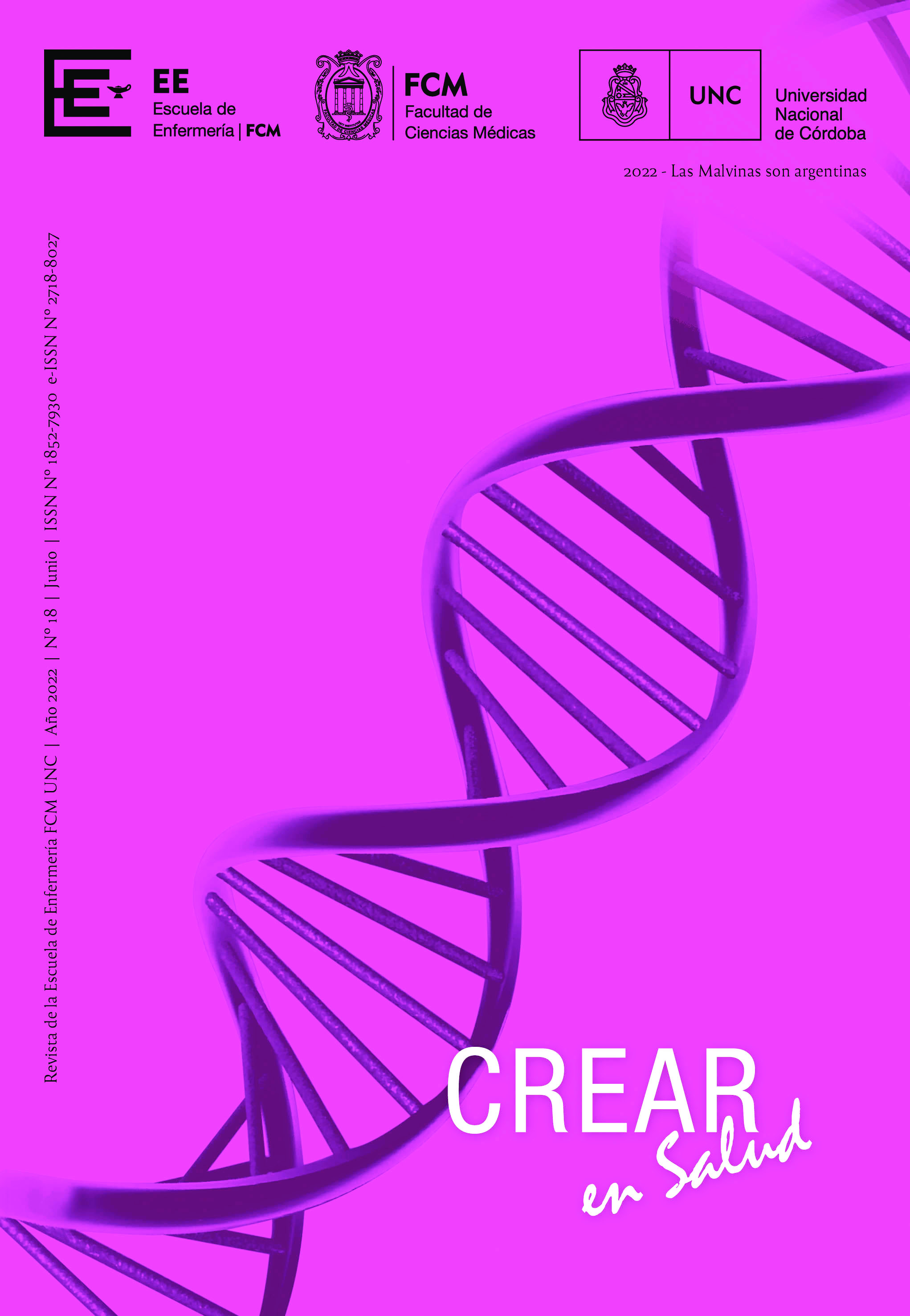INFORMATION ABOUT THE CHARACTERISTICS OF THE NURSING PROFESSION
Keywords:
Equipes de saúde-profissão-Enfermagem-informação.Abstract
Introduction: To a global level, nursing constitutes the half of the healthcare workforce
and it is identified as being responsible for the coordination of teams at different levels of
healthcare. The National Directorate of Talent and Knowledge (2021) reported that, among
the nursing personnel, 11 % of it had a licentiate degree, 41 % of it were regular nurses and
48% of it were assisting nurses. The nursing work is handled by healthcare agents, who have
a profession with a clear role, specific functions and status within the interdisciplinary team.
The objective was to determine information on the characteristics of the nursing profession
possessed by the interdisciplinary team at the Príncipe de Asturias Hospital in Córdoba in
2021. Methodology. Universe: 125 professionals. Sample: 94 professionals. Data collection
technique: self-administered survey. Instrument: A questionnaire with 10 semi-structured
questions. Results: 94 subjects were observed. While 13 % of them claimed to have information
in the form of their own knowledge on nursing, 87 % of them did not have that information.
Regarding the care implemented, 93 % of the subjects provided a positive answer, while 3
% of them provided a negative one. Regarding the level of professional training, 65 % of the
subjects answered negatively, while 35 % of them had information on the matter. Regarding
autonomy characteristics, 84% of the subjects answered negatively, while the 10% of them had
information on the matter. Regarding the ethical code, 96% of the subjects reported having
no information on the matter, while 4% of them had information on the matter. DiscussionConclusion: As for the information about the characteristics of the nursing profession possessed
by the interdisciplinary team, it is limited in the first place; secondly, there is little information
in the form of knowledge and, regarding autonomy, it is insufficient. In view of what has
been exposed here, the interdisciplinary team lacks information on the characteristics of the
nursing profession. The observed results coincide with Coffre’s view (2020) on the weakened
social image of the nurse, chased by old stigmas that remain prevalent at the present time. It
is necessary to improve nursing’s social image through its strengthening, reinforcing identity,
leadership and research. Recommendations: It is important to generate research, to disseminate
information, to communicate the scientific aspect of the profession to interdisciplinary teams
and to the society at large and to share different settings with interdisciplinary teams at
institutions where nursing performs its functions.
Downloads
References
Amezcua, M. (2018). ¿Por qué afirmamos que la Enfermería es una disciplina consolidada? Revista Index de Enfermería, 27 (4), 188-190. https://scielo.isciii.es/scielo.php?script=sci_arttext&pid=S1132-12962018000300002
Barberá Ortega, M. Cecagno, D. Seva Llor, AM. Heckler de Siqueira, C. López Montesinos, MJ. Loreto MS. (2015). Formación académica del profesional de enfermería y su adecuación al puesto de trabajo. Revista Latino Americana Enfermagem, 23 (3), 404-10.file:///C:/Users/Usuario/Desktop/Barber_etal_2015.pdf
Bastias, F. Giménez, I. Fabaro, P. Ariza, J. Caño Napp, MJ. (2020). Representaciones sociales sobre el enfermo. Diferencias de los estudiantes que ingresan con los que egresan de la carrera de Enfermería. Revista Investigación y Educación en Enfermería, 38 (1). http://www.scielo.org.co/pdf/iee/v38n1/2216-0280-iee-38-01-e05.pdf
Burgos Moreno, M. Paravic Klijn, T. (2009). Enfermería como profesión. Revista Cubana de Enfermería, 25 (1-2). https://www.studocu.com/es-ar/document/universidad-austral/enfermeria/enfermeria-como-profesion/24308483
Consejo Internacional de Enfermería. Código Deontológico del CIE para la profesión de enfermería. (2012). https://www.icn.ch/sites/default/files/inline-files/2012_ICN_Codeofethicsfornurses_%20sp.pdf
Consejo Internacional de Enfermería. Código Deontológico del CIE para la profesión de enfermería. (2006). http://www.ee.lafe.san.gva.es/pdfs/icncodesp.pdf
Casiani, S. (2018). Perspectivas de enfermería y la campaña Enfermería ahora. Revista Brasileira de Enfermagen, 71 (5), 2351-2. https://www.scielo.br/j/reben/a/Sxq6q8WP8Gfq98CkzsXgW6q/?format=pdf&lang=es
Escobar Castellanos, B. y Sanhueza Alvarado, O. (2018). Patrones de conocimiento y expresión de Carper en la atención de enfermería. Estudio de revisión. Revista Enfermería Cuidados Humanizados, 7 (1), 27-42. http://www.scielo.edu.uy/pdf/ech/v7n1/2393-6606-ech-7-01-27.pdf
Franco Coffré, J. A. (2020). Percepción social de la profesión de enfermería. Revista Electrónica Enfermería Actual de Costa Rica, 38, 272-281. https://revistas.ucr.ac.cr/index.php/enfermeria/article/view/36930/40657
García V, Brito PR, Fernández DÁ, Reyero B, Ruiznavarro C. (2015) ¿Cómo crees que te ven?: imagen de la enfermería percibida por profesionales y usuarios. Santa Cruz de la Palma, 9 (3), http://dx.doi.org/10.4321/S1988-348X2015000300017
Grupo parlamentario de todos los partidos sobre salud global. (appg) (2016). Triple impacto. Cómo el desarrollo de la enfermería mejorará la salud, promoverá la igualdad de género y apoyará el crecimiento económico. http://wp.ameenfermeria.com/wpcontent/uploads/2019/08/Triple-Impacto_esp.pdf
Luengo Martínez, C. Paravic Klijn, T. (2016). Autonomía Profesional: factor clave para el ejercicio de la Enfermería Basada en la Evidencia. Revista Index de Enfermería, 25 (1-2), 42-46. https://scielo.isciii.es/scielo.php?script=sci_arttext&pid=S1132-12962016000100010
Manual CTO Oposiciones de Enfermería, Modelo y teorías de Enfermería: características generales de los modelos y principales teóricas. https://www.berri.es/pdf/manual%20cto%20oposiciones%20de%20enfermeria%20%20pais%20vasco%E2%80%9A%20vol%C3%BAmen%201/9788417470050
Mena Tudela, D. González Chordá, V. M. (2018). Imagen social de la enfermería, ¿estamos dónde queremos? Revista Index de Enfermería, 27
(1-2), 5-7. http://scielo.isciii.es/scielo.php?script=sci_arttext&pid=S1132-12962018000100001&lng=es&tlng=es
Martínez Pérez, M. (2008). Arte y ciencia de la enfermería. Revista Médica Electrónica, 30 (1), 147-152.http://www.revmedicaelectronica.sld.cu/index.php/rme/article/view/481/pdf
Ministerio de Salud Argentina. Dirección Nacional de Talento Humano y Conocimiento. Estado de situación de la formación y el ejercicio profesional de Enfermería en Argentina. (2019). https://www.argentina.gob.ar/sites/default/files/20210-04-28-situacion-enfermeria abril_2021.pdf
Organización Mundial de la Salud. (2020), Situación de enfermería en el mundo. Invertir en educación, empleo y liderazgo. https://apps.who.int/iris/bitstream/handle/10665/331675/9789240003392-spa.pdf
Perez Toríz, J.; Báez-Hernández, F.; Flores Merlo, M. Nava-Navarro, V, Morales Nieto, A. (2021). El significado del cuidado enfermero en el contexto de la pandemia COVID-19. Sanus, 5 (16), 00002. https://doi.org/10.36789/sanus.vi16.236
Rubio Acuña, M. (2013). Fenomenología y conocimiento disciplinar de enfermería. Revista Cubana de Enfermería, 29, (3). http://www.revenfermeria.sld.cu/index.php/enf/rt/printerFriendly/145/63
Vergara Hernández, CI. Carbonell Muñoz, ZB. Díaz Caballero, JA. (2020). Situación laboral de los egresados de la Facultad de Odontología de la Universidad de Cartagena. Revista cubana Estomatol. 57 (2), 1253. http://scielo.sld.cu/scielo.php?script=sci_arttext&pid=S003475072020000200007&lng=en&tlng=en
Downloads
Published
How to Cite
Issue
Section
License

This work is licensed under a Creative Commons Attribution-NonCommercial 4.0 International License.



